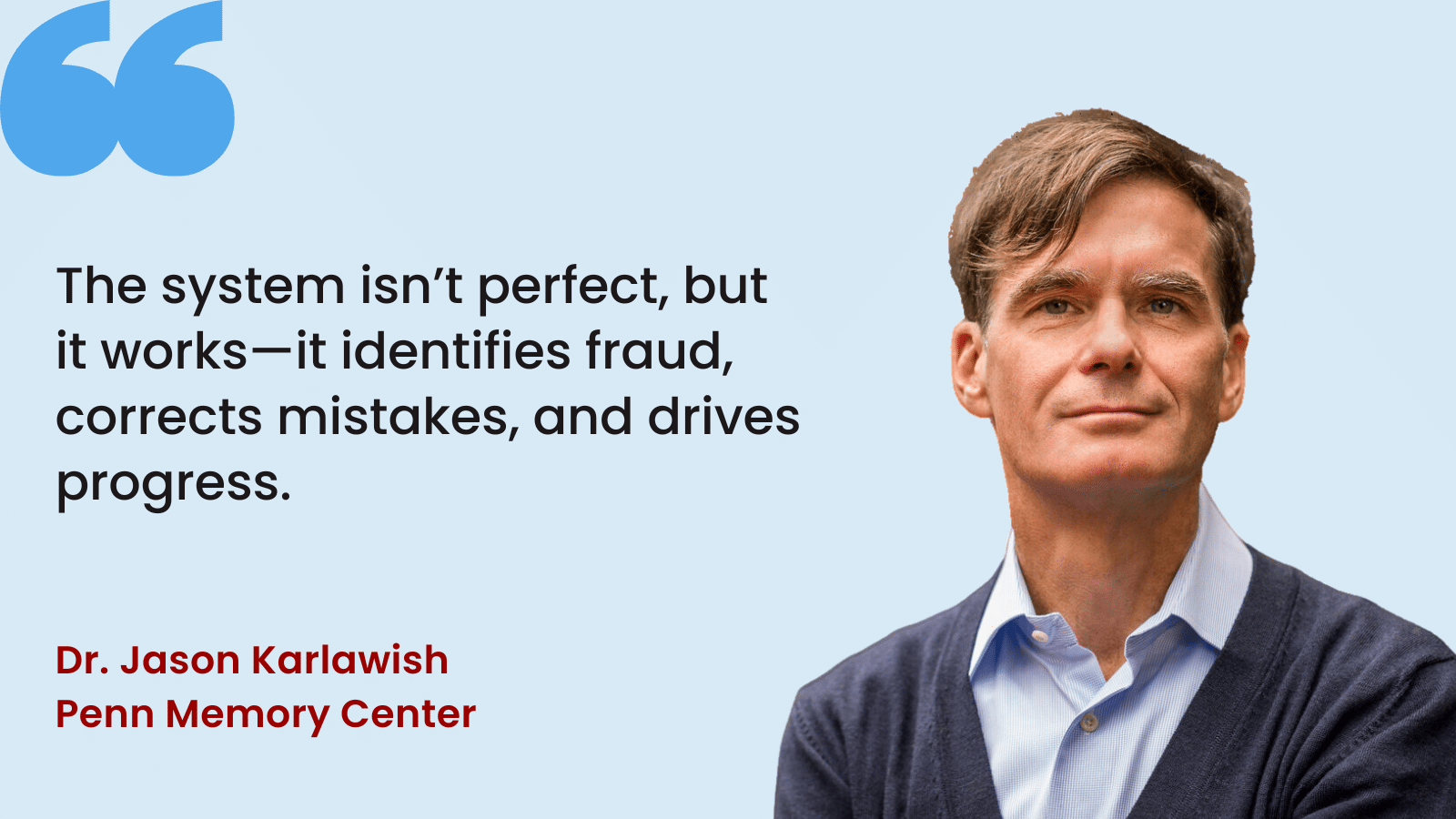A newly released book by investigative journalist Charles Piller has sparked concern across the Alzheimer’s research community — and not because of its critique of scientific misconduct. Rather, it’s the sweeping, unfounded suggestion that such misconduct permeates the field and undermines decades of rigorous progress in understanding and treating Alzheimer’s disease.
At the Penn Memory Center and beyond, researchers and clinicians are pushing back.
In a recent article for MedPage Today, Jason Karlawish, MD, co-director of the Penn Memory Center, cautions that Piller’s message in Doctored: Fraud, Arrogance, and Tragedy in the Quest to Cure Alzheimer’s, is sensational.
“The problem is that the facts don’t support Piller’s message,” Dr. Karlawish wrote. “It’s sensational, and in my experience, it’s causing harm.” He details how patients and research participants are becoming increasingly hesitant to engage in promising clinical trials or consider approved anti-amyloid therapies such as lecanemab (Leqembi) and donanemab (Kisunla).
The risks of such hesitation are real. “All of this undermines the successes we’ve made and the research we still have to do,” Dr. Karlawish wrote. While he acknowledged legitimate critiques of early decisions, such as the controversial approval of Aduhelm, he argues that the system, including peer review, government investigations, and public scientific discourse, worked to correct missteps and safeguard trust.
Other leading scientists shared Dr. Karlawish’s concerns. In a commentary on Alzforum, a news site supporting Alzheimer’s research and treatment development, John Hardy, PhD, chair of the Molecular Biology of Neurological Disease at the University College London’s Institute of Neurology, noted that Doctored draws demonstrably false conclusions and fails to connect documented cases of fraud with the robust clinical research behind current FDA-approved treatments. “Piller barely mentions that there is a large body of converging evidence, from dozens of laboratories all over the world, supporting the amyloid hypothesis,” Dr. Hardy wrote.
Eric Reiman, MD, director of the Arizona Alzheimer’s Consortium, criticized the book for confusing stakeholders and undermining public trust at a pivotal moment. “While nearly all of the Alzheimer’s drug programs failed, each failure taught us something,” he notes, adding that recent progress, including promising new blood tests and disease-modifying therapies, deserves recognition.
Bruce Lamb, PhD, executive director of the Stark Neurosciences Research Institute at Indiana University, argued Piller’s focus on a handful of unethical individuals paints an unfair picture of the thousands of exceptional researchers who have made meaningful contributions. “In science, theories about the causes of disease and the development of treatments are never the work of a single person,” Dr. Lamb and colleagues wrote in a public letter signed by 25 prominent researchers. “When theories are disproven, the field moves on, and when discoveries are proven correct, the field continues to build on them and push the science forward.”
The concern is not that Piller highlights misconduct. It is that he frames isolated instances as representative of an entire field, ignoring the transparency, scrutiny, and ethical commitment embedded in modern clinical research. Bart De Strooper, MD, PhD, founding director of the UK Dementia Research Institute, expressed dismay that Science magazine, where Piller is affiliated, allowed its name to lend credibility to such a distorted narrative. “Mr. Piller exploits his association with Science to gain respectability and blur the line between peer-reviewed research and his rhetoric,” he wrote.
At a time when more families than ever are affected by Alzheimer’s, and when science is finally offering hope through diagnostics, treatment, and prevention, trusted public communication is critical. Dr. Karlawish concluded his essay, “Trust is delicate, like porcelain: easily cracked and, once cracked, hard to repair.”
